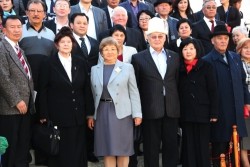
Oct. 2014 — One of the key challenges to democracy in the Kyrgyz Republic is corruption in state institutions. Closed-door decision making prevents citizens from holding their leaders accountable. Although former President Roza Otunbaeva sought to combat this problem by establishing public councils in state bodies, the sustainability of these independent, diverse citizen oversight groups was unsure because the decree could be reversed by any future president.
With USAID support, during 2011 to 2013, the International Center for Not-for-Profit Law (ICNL) helped a working group of public board members draft the Law on Public Councils of State Bodies, which would establish these bodies in law and strengthen the independence of the existing councils. After a long advocacy process, the draft law was passed by the Parliament in April 2014 and signed into law by President Almazbek Atambayev on May 26.
The new Law on Public Councils of State Bodies is a significant victory for civil society and the development of democratic institutions in Kyrgyzstan. It is designed to strengthen the sustainability of public councils and improve the process by which members are appointed. The law provides for the councils’ independence by limiting the discretion of state bodies over their activities and requiring appointment of board members by an independent selection commission. This will allow public councils to perform their oversight functions without risk of being pressured by state bodies.
The new law will also make the government decision-making process more open by authorizing public councils to monitor the proper use of budgetary funds and to detect corruption in state institutions. It also ensures that public councils will have a prominent platform to share their findings by publishing and presenting annual reports. This will substantially strengthen citizen participation in government policymaking—a powerful tool in fighting government corruption.
“At present, public councils have been created in 36 ministries and state agencies of Kyrgyzstan,” said Nuripa Mukanova, chair of the coordination committee of the public councils. “We believe that public councils will make a great contribution towards improving the work of state bodies.”
Creation of the new law was part of ICNL’s Legal Support for Civil Society Program, which works to foster an enabling legal and fiscal environment for civil society organizations to operate in Central Asia.
LINKS
Follow @USAIDCtrAsia, on Facebook, on Flickr, on YouTube







Comment
Make a general inquiry or suggest an improvement.